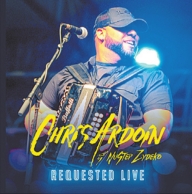
Chris Ardoin
Requested Live
To be honest, Chris Ardoin’s Requested Live is not a live album in the traditional sense. Instead, it’s more of a live mixtape, pulling live takes from different shows and a variety of flavors. And it’s so well produced and clean by studio standards that it’s hard to believe it’s a live cut at all. If not for the subtle hints at the end of certain tracks — minimal bits of crowd noise, mentions of a live recording taking place — it would pass for a best-of mixtape.
What Requested Live presents is a live best-of or a bestof-live collection. These are the songs audiences want to hear the most. And that’s what Ardoin — a zydeco circuit, festival staple and flag bearer for the Ardoin legacy — gives them.
Although pivotal in the new — or nu — school of zydeco, here Ardoin retains middle-of-the-road sounds that make him a draw. True, there are plenty of R&B influences to be heard, but the unmistakable and powerful sounds of Creole Southwest Louisiana fill the record.
Ardoin’s take on genre for the record is an updated songbook. He’s not about that sharecropper life, but relatable topics of love, lust and longing. Yet, it is absent of tracks that completely cross over, something he has done in some of his studio work: “Candy Man,” “Grown Folk Business,” “Party Til the Sunrise” and the remixes of various cuts such as “Sweat.” Instead, Ardoin’s live vault opens to reveal tracks akin to the majority of his albums’ material — classic Creole accordion weaved into new or borrowed songs with dance floor-filling rhythms à la “Waitin’ 4 This Moment,” his adaptation of Phil Collins’ “In the Air Tonight.”
Requested Live’s 18 tracks run through his back catalog, hitting high notes such like “Fightin’ Temptation,” “Cry,” “Stallion” and “Luv Gun.” In live-record fashion, there are some twists and turns as songs like “Zydeco Boogaloo” segues into “Waitin’ 4 This Moment” and “Stallion” transitions into a zydeco version of Ginuwine’s “Pony,” a point that finds Ardoin at his most modernized. Still, it is straight-forward Ardoin — don’t expect drawn-out jams that radically change the source material.
If there is a fault it’s that Requested Live stays in the same gear through most, if not all of, the album. Though it is just one gear, it is a good gear. Also, with the lack of raw live edges normally found on a live record, it comes off a bit muted. But, for fans of Ardoin, these are not cons at all but simply a guarantee that Requested Live is just what they want — a collection of him at his best, live.

Courtney Granger
Beneath Still Waters
How country is Courtney Granger’s Beneath Still Waters? It’s so country that playing it turns paved roads to dusty gravel, loafers into a pair of well-worn Justin boots and billboards into flickering neon signs. It’s so country that if played 10 times straight,
Keith Urban’s tour bus gets a flat. Repeated listens lead to hopping on
the back of a Cub Cadet and heading to the corner store to pick up a
sixer of the cheapest brew, just like the Possum. It’s so country that,
unless mistaken in a bin bound for the Saturday old school country show,
it won’t be getting radio play on mainstream country radio.
From
the first slow thump of the stand-up bass and the tap-tap of the snare
rim on “Don’t Put Her Down, You Helped Put Her There,” it’s clear this
is a love affair with classic, smoky barroom county. The writing credits
read like selections off a great honky-tonk jukebox with an emphasis on
the lonesome and heartbroken songs. Granger’s lineage — the nephew of
the great Dewey Balfa and a member of Balfa Toujours — only acts to
further the pain-equals-inspiration equation. Throughout, Granger honors
the late George Jones by covering numerous songs the Possum made
famous. Almost all are of the heartbreak variety. This record either
drowns your sorrows or gives them a run for their money.
Sometimes
Granger is the second coming of Jones; other times he sounds a bit like
Jones ever so slightly mixed with a deeper Lester Flatt. Always
effortless and legit and solid country, his voice
begs
the question: How does it come out of Granger, the skinny kid with the
fiddle? Granger doesn’t go down the obvious Jones path — “He Stopped
Loving Her Today,” “She Thinks I Still Care,” etc. — but resurrects lots
of his almost-as-popular classics. His takes on Jones’ material, such
as “Mr. Fool,” “Back in My Baby’s Arms Again” and the title track are so
right on the money they easily pass for remastered retakes. He also
re-imagines tracks by country stars like Waylon Jennings, Vern Gosdin,
Mel Street, Keith Whitley, Hazel Dickens and Alice Gerrard, not to
mention “My New Year Starts Now” by Dirk Powell, which passes as a
classic without raising any alarms. No matter the style — the high
lonesome of Dickens and Gerrard or the outlaw country of Jennings — here
they are tuned to Jones’ frequency.
This
record will do well on local classic country stations and with fans. It
will also receive high praise from like-minded publications near and
far. But it won’t burn up the chart the way Jones did. That’s not
because of a lack of quality; it has that tenfold. Instead, after all,
it is too country for the country charts. And that is the saddest part
of all.
Nick Pittman is a freelance entertainment and feature writer. To contact him, email [email protected].